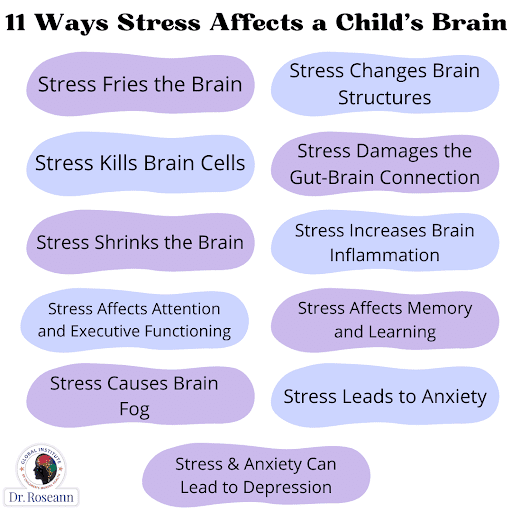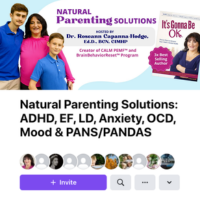Children and teens today face a lot of stress. The stress they face at school and socially has only been compounded by the chronic stress from social isolation and the disjointed learning they experienced during the pandemic.
As much as we have accepted stress as a part of our daily life, chronic stress does impact the brain and our health. As parents, we have gotten really comfortable running on empty and we are invertedly sending the message to our children, “Keep pushing through it.” And stress can have lasting effects as we see with such a rise in mental illness, especially with our ongoing pandemic stress.
The reality is no one is immune from stress and our body knows no difference between good and bad stress, so it is very easy to get stress hijacked. There is a difference between tolerable stress and repeated, chronic stress and we have swung to the latter.
There are many ways stress affects the brain of our children and teens. 11 Ways Stress Affects the Brain:
#1 Stress Fries the Brain
There is no way around it, chronic stress affects how we think. It is easy to feel fried when we are overloaded and overwhelmed by the stress in our life. When your brain is fried, you feel mentally and physically exhausted, which makes learning, paying attention, and regulating your mood hard.
#2 Stress Changes Brain Structures
Excessive stress disrupts the architecture of the developing brain in children. Yes, that's right, stress affects how the brain architecture develops in children. Early childhood is a critical developmental period in so many ways and adverse childhood experiences can have a lifelong impact on a child's physical and mental health. Sustained levels of stress hormones, cortisol or corticotropin-releasing hormone (CRH), can lead to impairments in learning, memory, and the ability to regulate certain behavioral responses. These changes impact specific brain structures such as the hippocampus, amygdala, white matter, as well as the neural networks (our brain’s communication system).
#3 Stress Kills Brain Cells
High levels of the stress hormone cortisol can wear down the brain’s ability to function properly. We know through research that stress impacts how our neurotransmitters work. These molecular changes also affect gene expression and the neuroplasticity of the brain. In a time when we just want a pill to fix mental health issues, getting to the root causes can help fix the underlying issues impacting neurotransmitter activity without relying on medication that is only a bandaid.
#4 Stress Damages the Gut-Brain Connection
The brain is connected to the gut through the vagus nerve and they have a bi-directional influence on each other. Neurotransmitters are formed in both the brain and the gut and you need both working properly in order to have healthy neurotransmitter activity. Stress reduces good bacteria in the gut which is needed to produce neurotransmitters. Ninety five percent of the brain’s serotonin is manufactured in the gut and it is an important neurotransmitter related to memory and mood.
#5 Stress Shrinks the Brain
We know through research that stress causes a reduction in grey matter volume in the prefrontal cortex. The grey matter in the brain enables individuals to control movement, memory, and emotions, and is important for critical thinking. Grey matter allows for the processing of information and if chronic stress reduces grey matter volume, then one’s attention, thinking, memory, and learning is impacted.
#6 Stress Increases Brain Inflammation
Chronic stress is a major trigger for persistent brain and body inflammation. Stress-induced chronic inflammation can lead to a range of mental and physical health problems, including anxiety, OCD, PANS/PANDAS, chronic pain, diabetes, heart disease, autoimmune disease, and many more conditions. People are becoming increasingly aware that brain inflammation is a source of mental health issues but lack awareness of solutions. I dive into solutions to reduce inflammation and improve brain and mental health in my book, “It’s Gonna Be OK!™”
#7 Stress Affects Attention and Executive Functioning
Stress and anxiety impacts executive functioning and attention for the simple reason that when your mind is filled with worry or your body is hijacked with uncomfortable sensations, you can’t pay attention to the task at hand. Stress and anxiety can be such a derailer of attention that it is common for people to think they have ADHD. In fact, at least 50% of the time someone comes to me thinking they have ADHD, they have another clinical issue with anxiety being the most common.
#8 Stress Affects Memory and Learning
Stress affects important memory structures in the brain. The Hippocampus plays a critical role in memory and connects to other parts of the brain and it is impacted by high levels of stress hormones. Continued high levels of stress hormones impacts hippocampal function, which directly impacts memory, as well as learning and how a child or teen behaviorally responds to stressors.
#9 Stress Causes Brain Fog
Brain fog is that unfocused, brain-tired feeling that you can get for known reasons, like having a newborn baby or when you are recovering from a virus, or it can result from chronic stress or chronic illness. Our kids experience this after too much screen time, not enough physical activity, social stress, school work overload, or poor diet.
#10 Stress Leads to Anxiety
Clinical anxiety can result from so much more than genetic reasons and repeated stress is one of the leading causes of anxiety. The thing about ongoing stress is that it creeps up on you and thus can be hard to spot in our kids until there is a full on crisis. In kids, anxiety shows up physically as gastro-intestinal issues, fatigue, crabiness, and sleep problems. I see so many high level students who have breakdowns with a history of belly aches, vomiting, chest pain, and poor sleep but everyone misses the signs of anxiety because they are straight “A” students. Grades should never be a benchmark of mental health but in the United States, they are.
#11 Stress and Anxiety Can Lead to Depression
Everyday in my Connecticut neurofeedback center, I see people in-person and virtually from all over the world who only made sense out of the sleeplessness, belly aches, and irritability after their child or teen shuts down, is depressed, becomes suicidal or had school refusal. The stress to anxiety to depression pathway is incredibly common amongst teens who may be doing well in school or doing okay with a lot of scaffolding. These teens often crash and burn when they try to launch to college and become depressed, failure to launch young adults.
Even though stress is all around us, there are science-backed ways to help your child or teen get calm, focused, and do better in school and home. Really, to improve a child’s life and of course, family life too. As caring adults and parents, we want the best for all children, so grab my free download, 9 Tips to Help Children Manage Stress.

Always remember… “Calm Brain, Happy Family™”
Are you looking for SOLUTIONS for your struggling child or teen?
Dr. Roseann and her team are all about solutions, so you are in the right place!
There are 3 ways to work with Dr. Roseann:
You can get her books for parents and professionals, including: It’s Gonna Be OK™: Proven Ways to Improve Your Child’s Mental Health, Teletherapy Toolkit™ and Brain Under Attack: A Resource For Parents and Caregivers of Children With PANS, PANDAS, and Autoimmune Encephalopathy.
If you are a business or organization that needs proactive guidance to support employee mental health or an organization looking for a brand representative, check out Dr. Roseann’s media page and professional speaking page to see how we can work together.
Dr. Roseann is a Children’s Mental Health Expert and Therapist who has been featured in/on hundreds of media outlets including, CBS, NBC, FOX News, PIX11 NYC, The New York Times, The Washington Post,, Business Insider, USA Today, CNET, Marth Stewart, and PARENTS. FORBES called her, “A thought leader in children’s mental health.”

She is the founder and director of The Global Institute of Children’s Mental Health and Dr. Roseann Capanna-Hodge. Dr. Roseann is a Board Certified Neurofeedback (BCN) Practitioner, a Board Member of the Northeast Region Biofeedback Society (NRBS), Certified Integrative Medicine Mental Health Provider (CMHIMP) and an Amen Clinic Certified Brain Health Coach. She is also a member of The International Lyme Disease and Associated Disease Society (ILADS), The American Psychological Association (APA), Anxiety and Depression Association of America (ADAA) National Association of School Psychologists (NASP), International OCD Foundation (IOCDF) International Society for Neurofeedback and Research (ISNR) and The Association of Applied Psychophysiology and Biofeedback (AAPB).
© Roseann-Capanna-Hodge, LLC 2023
Disclaimer: This article is not intended to give health advice and it is recommended to consult with a physician before beginning any new wellness regime. *The effectiveness of diagnosis and treatment vary by patient and condition. Dr. Roseann Capanna-Hodge, LLC does not guarantee certain results.













